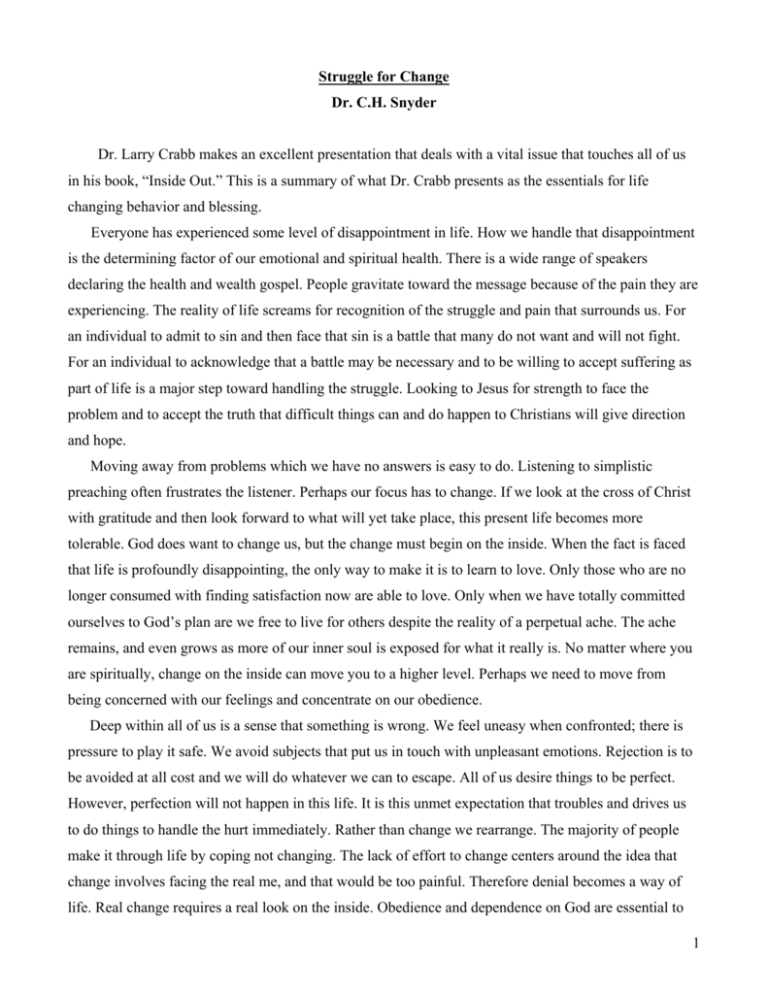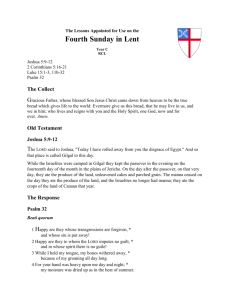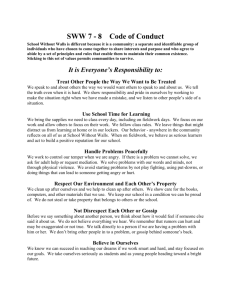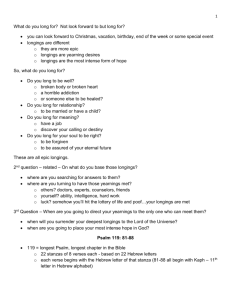Struggle for Change - Grace Chapel Ministries
advertisement

Struggle for Change Dr. C.H. Snyder Dr. Larry Crabb makes an excellent presentation that deals with a vital issue that touches all of us in his book, “Inside Out.” This is a summary of what Dr. Crabb presents as the essentials for life changing behavior and blessing. Everyone has experienced some level of disappointment in life. How we handle that disappointment is the determining factor of our emotional and spiritual health. There is a wide range of speakers declaring the health and wealth gospel. People gravitate toward the message because of the pain they are experiencing. The reality of life screams for recognition of the struggle and pain that surrounds us. For an individual to admit to sin and then face that sin is a battle that many do not want and will not fight. For an individual to acknowledge that a battle may be necessary and to be willing to accept suffering as part of life is a major step toward handling the struggle. Looking to Jesus for strength to face the problem and to accept the truth that difficult things can and do happen to Christians will give direction and hope. Moving away from problems which we have no answers is easy to do. Listening to simplistic preaching often frustrates the listener. Perhaps our focus has to change. If we look at the cross of Christ with gratitude and then look forward to what will yet take place, this present life becomes more tolerable. God does want to change us, but the change must begin on the inside. When the fact is faced that life is profoundly disappointing, the only way to make it is to learn to love. Only those who are no longer consumed with finding satisfaction now are able to love. Only when we have totally committed ourselves to God’s plan are we free to live for others despite the reality of a perpetual ache. The ache remains, and even grows as more of our inner soul is exposed for what it really is. No matter where you are spiritually, change on the inside can move you to a higher level. Perhaps we need to move from being concerned with our feelings and concentrate on our obedience. Deep within all of us is a sense that something is wrong. We feel uneasy when confronted; there is pressure to play it safe. We avoid subjects that put us in touch with unpleasant emotions. Rejection is to be avoided at all cost and we will do whatever we can to escape. All of us desire things to be perfect. However, perfection will not happen in this life. It is this unmet expectation that troubles and drives us to do things to handle the hurt immediately. Rather than change we rearrange. The majority of people make it through life by coping not changing. The lack of effort to change centers around the idea that change involves facing the real me, and that would be too painful. Therefore denial becomes a way of life. Real change requires a real look on the inside. Obedience and dependence on God are essential to 1 real change. But that is not all that is required. Real change is more often found by people who realistically face difficulties than by those who manage to preserve pleasant feelings by ignoring the tough things in their lives. Very often, a commitment to obedience reflects not a passionate desire to pursue God, but a stubbornly fearful determination to not feel deep frustration and pain. God is most fully known in the midst of confusing reality. When men sense their failures they retreat to whatever area of life offers them a sense of competence and safety. Christians are realizing that their version of church involvement, time in the Word, commitment to do right and claiming God’s promises are somehow not getting to the core troubles of their heart. It seems we always come up short. Nothing satisfies; nothing works. It is sin that frustrates us, and we cannot escape the presence of sin in this life. I cannot be perfect, but I can be better. Our Lord made it clear that doing right in His eyes required far more than the performance of certain activities. The entire law could be summarized in two commands: love God and love others. Moral effort alone can never produce genuine love. To love as God has commanded requires dramatic inner change. Learning to love is essential to overcome psychological problems. Looking into the heart is important and touchy. The choice for many sincere, struggling Christians is either: (1) Ignore the critical issues of internal character development and just try harder to be good Christians without ever understanding what’s happening beneath the surface of their lives. (2) Take an inside look guided more by current psychological theory than by Biblical revelation. Neither of the two options moves us toward the kind of deep character change our Lord desires. In order to change we must first identify what needs changing. The Bible tells us to guard our heart (Proverbs 4:23) and tells us our heart is deceitfully wicked and impossible to understand (Jeremiah 17:9). If our heart is as difficult to know as the Bible states, then any hope of understanding our heart depends entirely on God’s willingness to help. Without God’s help, no effort to explore the heart will ever identify the real problems that need changing. Two observations are suggested. First, people are thirsty. Although the fact of universal thirst is not directly stated it is clearly assumed. God designed us to enjoy tension free relationships filled with deep, loving acceptance and with opportunities to make a difference in someone else. Second, people are moving in the wrong direction in response to their thirst. They refuse to trust God to look after their thirst. Instead, they insist on maintaining control of finding their own satisfaction. The disease of self-management is our problem. Fallen man is both terrified of vulnerability and committed to maintaining independence. The Scriptures consistently expose people as both thirsty and foolish. We long for the satisfaction we 2 were built to enjoy, but we all move away from God to find it. We have a need and we seek to meet that need the wrong way. Two categories of Christians emerge: those who have high standards of commitment and those who are content to live ordinary, respectable lives. The first group includes people who are frustrated with their inability to measure up to their ideals and a few who are satisfied with their performance. The second group consists mostly of folks who live reasonably happy lives as long as money, health, and relationships are doing well. Our Lord severely rebuked people whose lives merely conformed to scrupulously high standards of religious conduct (Matthew 23:13-36). Outside cleanliness, whether the product of zeal or of complacency does not impress our Lord. For people who are disillusioned and discouraged after years of trying hard to do everything right, the news is good: more effort isn’t the answer. The goal of change from the inside out is not conformity to Christian standards or increasing levels of happiness. Both conformity and happiness must develop as byproducts of maturity. Our deep stubborn sinfulness is at the heart of the problem. We want certain things. We want to feel a certain way; we want people to make us feel good by the way they treat us. We do everything out of motivation. It is okay to desire, but the desires must be handled biblically. Because we want or desire what we cannot have in this world, there will be pain. Accepting hurt as a part of life is essential to handling life properly. I want to be respected and when I am not, hurt comes. I need relationships that accept me fully, the way I am without backing away when I am not perfect. We do not want to admit that people cannot handle all of my faults. Since the fall, no human being has the capacity to love us perfectly. We cannot rid ourselves of the desire to have what no one has given. We receive neither respect nor involvement to the degree we deeply crave. In order to deal with this loss we focus on other matters in an attempt to hide the pain. It is okay to desire good things, but we need to realize that we will not get our desires totally met here on earth. Nothing less than perfect relationships in a perfect world among perfect people will make pain-free happiness a reality. Hurting is a reality and it’s really okay for Christians to hurt. Not only is it okay to hurt, but we need to understand that sin is a bigger problem than we think. When relief of the inevitable pain of living in a fallen world becomes our priority, at that moment we leave the path toward pursuing God. God’s prescriptions for handling life do not relieve an ache that is not meant to cease this side of heaven; they enable us to be faithful in the midst of it. Obedience may actually intensify the pain that we feel. In an attempt to eliminate the pain we commit sinful acts that give short-term relief, constantly trying to eliminate the hurt represents a denial of reality. The fact is 3 that something is wrong with everything. We must remember that our Lord’s promise of paradise today was given to a man about to die. Faith is required because life can be overwhelmingly confusing. And love is the only approach to life that achieves God’s purposes and gives us a sense of relationship. Often those who are following Christ the closest are experiencing the most difficulty. The desires of life can be classified into three groups: crucial longings, critical longings and casual longings. The casual longings can be filled by me, critical longings need to be met by another person, and crucial longings can only be met by God. When my casual longings are not met I feel some discomfort. When my critical longings are not meant I feel more than discomfort, I feel a deep sorrow, an immobilizing lostness. Both casual and critical longings involve desires for a relationship. The third category, crucial longing, can only be met by God. When crucial longings are not met a deep pain develops which must be dealt with. Until we acknowledge painful disappointment in our circumstances and relationships, we will not pursue Christ with the passion of deep thirst. We rarely depend upon God when our lives are comfortable. We must honestly admit to deep sadness and disappointment, sometimes reaching the level of soul-wrenching despair, as we consider our human relationships. Frustration, properly handled, will drive us toward God. Those who walk the closest to God feel their disappointment the most. The knowledge of how things should be makes the reality of how things are all the worst. No matter how richly we experience the Lord, we cannot avoid the pain of living in a fallen world as a fallen being. When Christ was here the reality of the sinful environment impacted Him as well. He was in perfect fellowship with the Father yet was still a man of sorrows, brought to tears by the hardness of men’s hearts. We must remove the idea that being obedient Christians produces good feelings all the time. We cannot measure the quality of our walk with the Lord by the absence of unhappy feelings. God’s unchanging love gives us purpose, identity, joy, and the courage to respond well to what life brings our way, good or bad. The longings of our heart must be faced. The disappointment of our soul must be experienced. Only then will we learn to pant after God in eager anticipation of His coming, when every desire will be forever satisfied. Most of us cope with life by pretending. We pretend that what we have satisfies more than it does. This can be seen in people who have experienced traumatic experiences 4 early in life. It is easier for them to suppress the feelings than to face the pain. To deal with what’s really going on inside is disturbing, too uncomfortable; so we hide the inside truth from others — and from ourselves. Those who do take a look sometimes crumble under the weight of what they discover. The choice before us is clear: either live to be comfortable (both internally and externally, but especially internally) or live to know God. We can’t have it both ways. The pain of living apart from God is unbearable —exposes our sinfulness as horribly grotesque and foolish. We insist on finding relief without coming to God on His terms. When God does not meet our demands, our only recourse is to handle the pain on our own. We’re limited to either denying how badly we hurt or to medicating ourselves through some form of temporary gratification. One thing that seems clear is that movement toward pain is suicide. But exactly the opposite is true. To explore and embrace our deepest hurts puts us in a small company of thirsty people who, because they feel their thirst, know what it means to come to Christ in deep and quiet trust. We cannot live without God because we were built to enjoy what only He provides. Our longings are therefore at the very center of our dependency. People who stay away from their hurt tend to develop a matter-of-fact relationship with Christ. People who embrace their hurt are able to pursue God more passionately. No amount of responsibility-taking will ever relieve the thirst for relationship. Only heaven offers complete satisfaction. Learning how to acknowledge the thirst could be organized into three suggestions: 1. Ask the tough questions that produce confusion. 2. Explore the imperfections of key relationships until you experience deep disappointment. 3. Study your own approach to relationships with openness to developing conviction. Believing that any confusion over the issues of God should be avoided, leads to a forced, mechanical trust rather than to a real and vital confidence. We are always looking for solutions to the problems, rather than simply trusting God through the problem. In every situation there is a way to respond that pleases God. Like the apostle Paul, the problem will not go away (the thorn in the flesh). We need to acknowledge that sometimes we need the struggle. 5 Confusion will either drive us away from the Lord, we can deny that it exists, or we can cling to the truth of God that we do understand what is happening. There will always be some level of confusion that will never go away, and we must accept that fact. Tough faith never grows in a comfortable mind. Letting ourselves experience confusion creates a thirst that only faith can satisfy. Perfect love is needed but never found in this life. Every child will be hurt and disappointed by their parents at some point. When we learn to accept people who disappoint us by no longer requiring them to satisfy us, then we’re free to love them, to reach toward them for their sake without having to protect ourselves from feeling disappointed by their response to us. The mature Christian is one who is growing in his ability to love people as they are, not as he wishes them to be. Let confusion drive us to faith. Making mountain top decisions to follow the Lord can be exciting, but often fades in the daily routine of life. The outward conformity to Biblical principles is good, but an inward change of heart is essential. The danger involves looking only at outward acts of sin and ignoring the sins of the heart. God’s command to his disciples was clear, “Love the Lord your God with all your heart, and your neighbor as yourself.” It is this command to love that creates the problem within us. The sins against relationships are overlooked on a consistent basis. Because relationships have the most potential for pain, our commitment to self-protection is most strongly honored in the ways we approach people. Everyone develops a style of relating designed to avoid the experience of deep personal pain-and that is the sin of self-protection. All of us project either self--protection or love, mostly self-protection. When our priority is to play it safe, love is left out. Demanding from others what we are not willing to give ourselves creates anger and resentment. God wants us to trust His love enough to freely love others, not to protect our longings from further injury. To change from the inside out requires that we repent of our self-protective commitment. Paying close attention to how a person makes you feel will give an indication of their protection mode. Everyone has a mode of protection. In a counseling session the counselor will get a certain feeling, which will indicate what type of protective screen is being used. This approach can be very helpful in understanding what needs to be addressed. When people deny their thirst, they cannot recognize the function of their relational style. But when thirst is acknowledged and self—protection is unmasked, then 6 trust in Christ can be profound. The mark of maturity is love, and the essence of love is relating without self-protection. But living without self-protection requires profound trust in Christ. We cling desperately to our acts of protection. Dr. Crabb begins to dig deep into an area that usually is overlooked or ignored. The tendency to demand, both from God and others, is a source of much of man’s problems. Struggling with a problem produces a sense of nobility, and others may even sympathize with your struggle. Sin on the other hand is dirty. Many people attempt to deal with their problems and thirst by changing the outward behavior. In reality an inner search for the root cause is necessary. When other people hurt us, we tend to struggle with the pain that follows. We cannot excuse our sinful responses to others on grounds of their mistreatment of us. We are responsible for what we do. We are strugglers and sinners, victims and agents, people who hurt and people who harm. When we decide it’s time to get serious about our responsibility to pursue God, we come back to the issue of obedience. We must understand that God is opposed to a demanding attitude on the part of His creatures no matter how severe their suffering. Job is a good example of one who sought an audience with God to plead his case. When God responded to Job, he was unable to justify himself. Even in the midst of our deepest pain God is still God, and we are still His creation. God will respond to the hurt in our soul and our desire for relief, but He is unmoved by our demands. The person who concedes that God may not do for him what seems so right is farther along in his understanding of God than one who cheerfully expects God to make everything better. Taking a look at ourselves and realizing that we are the ones who need to change and not God is a first step. A demand for God to change is a challenge to His power, righteousness, and holiness. God asked Job, “Would you discredit my justice? Would you condemn me to justify yourself?” (Job 40:8). Doing good things does not automatically turn us into good people. The deceitful character of our heart helps us believe that things are better than they really are. Have we compromised an opportunity to love in order to stay safe? Trying to stay safe will force us to hold back from giving to others. To demand anything, including what we believe is essential to our well-being, reflects arrogant pride, a sin that tops the list of what God detests. If we are to make our words good, we must first clean up their source. “Above all 7 else, guard your heart, for it is the wellspring of life” (Proverbs 4:23). The sole value of an inside look is measured by its helpfulness in moving us toward greater love, both for God and for others. Disciplined people won’t recognize their protective rigidity without help. Analytic types will fail to see that their cool logic, far from being admired, discourages those who would like to be close friends. Successful extroverts may go through life thinking everyone enjoys their social activity. Shy people may continue to regard themselves as quiet because of temperament and never see that their quietness is a protective cloak. Three sources of light: 1. The Spirit of God 2. The Word of God 3. The People of God We tend to focus on the wrong things. When things are going well we tend to drift away from God. We rarely listen to God’s conviction concerning how we treat other people when we are on a roll. It is possible to spend years studying the word of God and make no progress. We can become so intense about the word of truth that it separates us from people. Sitting in our study, doors closed, studying the word of God, but never touching the people of God. “Knowledge puffs up, but love builds up” (I Cor. 8:1). Biblical scholarship may be more important than impressions but it’s worth nothing if it doesn’t lead to personal contact. I need to see myself the way I really am. The body of Christ will give a good indication of where I am in the body. Giving and receiving feedback in a proper manner is essential. Christians have only two options when it comes to forming relationships: either remain comfortably distant from the struggles and sinfulness in one another or open up and deal with the results. However; looking at lives honestly has the potential to divide and destroy, but there is also the power to bless. Honest sharing is not the final goal. Love is the goal. Good fellowship is characterized by support and kindness, not confrontation. Sometimes the reality of human suffering is just too much. Something is really wrong with everything. An honest look at life will uncover problems everywhere. People refuse to deal with their sin. Self-protection is a category of sin people never consider. Most people never see how ugly it is to not love. When we face how deeply disappointed 8 we are with our relationships, it then becomes possible to recognize the ugliness of what before seemed reasonable. No one is ever fully changed in this life. Identifying problem areas involves looking at problems in our world, pain in our heart, and sin in our behavior. There is a fourth problem and that is sin in our heart. We tend to make relief of our pain the goal of our lives. There must be a serious look at the decisions we make, not just the result of our disappointment. We cannot recognize self-protection until we see what we’re protecting. When relieving pain becomes our priority, then we have left the path of pursuing God. Deficient love is always central to our problems. Love is never blind to others’ faults. We must not ask more of others than they can provide. Depressed people have been disappointed by others and feel a terrible internal vacuum. The struggle to live in disappointing relationships will continue until heaven. We are looking for a type of change that God never promised. We manage to interpret biblical teaching to support our longing for perfection. The idea that peace and joy might merely support us during times of struggle and sorrow rather than eliminate those times is not appealing. To make no effort to clean up the mess and to live without self-protection is terrifying. It makes no sense. It feels like the route to death. Real change is available now; it’s just not the kind of change we want. We insist that the real change heaven will bring (an end to all pain) be ours today. That insistence is the problem we must overcome if the real change that’s possible now is to come. The gospel’s power today lies in its resources to help us overcome a demanding spirit and to replace it with trust as we await the full revelation of its power. It is possible to fix our attention on wonderful things about God in order to ignore terrible things about ourselves. Without repentance, a look at Christ provides only the illusion of comfort. Every effort to change must involve at its core a shift in direction away from dependence on one’s own resources for life to dependence on God. We will genuinely love only as we deal with the sin in our heart. Life is found by making no effort to keep it. “The ways of the Lord are right; the righteous walk in them, but the rebellious stumble in them” (Hosea 14:9). Repentance is neither a complete cure nor an easy one. Spiritual depth frees us to be spontaneous in the midst of sadness. We must know what it means to be let down and see how we can protect ourselves from further disappointment. When people turn from God, the first thing they pursue when God removes His restraining hand is sexual pleasure. 9 The primitive threat that’s always present in fallen people (a legacy left to us by our first parents) makes boys aware of their weakness, incompetence, and helplessness. As they sense an impotence to enter their world with strength, they learn to compensate by emphasizing whatever special abilities or talents they discover in themselves. Or they generate a counterfeit sense of masculinity through aggression, rebellion, and exaggerated independence. Or they retreat into a passivity that demands someone take care of them. When someone wins a girl’s trust to the point where she risks exposing that deeply feminine desire to be entered, and then betrays her trust (sexual abuse is the worst form of betrayal), she comes to regard those desires within her as reason for shame and selfdisgust. Males lack the healthy confidence that they can move into the world unafraid. Females lack that quietly exhilarating awareness that they’re secure women who can embrace their world with no worry of having their essential identity crushed by someone’s abuse or rejection. Until we grasp how deeply we long for what we do not have, our enjoyment of life’s pleasures is defensive. We will depend on them to obscure the emptiness of our soul. The illusion that life in a fallen world is really not too bad must be changed. When we are on the brink of personal collapse we can begin to move the direction of our soul from selfprotection to trusting love. Repentance means to accept the truth that life without God is no life at all and to therefore pursue God with all the passion of someone who has been rescued from unimaginable horror. When we realize life cannot give us what we want, we can better give up our foolish demand that it do so and get on with the noble task of loving as we should. The realization that every moment consists of a moral choice to look after self or to put others first is staggering. Real change is possible if we are willing to search deep within our hearts for the real issues of life. 10







